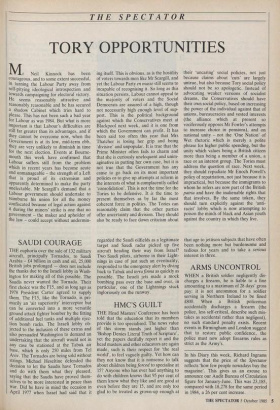THE SPECTATOR
TORY OPPORTUNITIES
Mr Neil Kinnock has been courageous, and to some extent successful, in turning the Labour Party away from self-pitying ideological introspection and towards campaigning for electoral victory. He seems reasonably attractive and reasonably reasonable and he has secured a shadow Cabinet which tries hard to please. This has not been such a bad year for Labour as was 1984. But what is more important is that Labour's difficulties are still far greater than its advantages, and if they cannot be overcome now, when the Government is at its low, mid-term ebb, they are very unlikely to diminish in time for the next election. Events at Bourne- mouth this week have confirmed that Labour suffers still from the problem which in recent years has become acute and unmanageable — the strength of a Left that is proud of its extremism and apparently determined to make the party unelectable. Mr Scargill's demand that a Labour government should undertake to reimburse his union for all the money confiscated because of legal action against It during the miners' strike is one that no government — the maker and upholder of the law — could accept without undermin- ing itself. This is obvious, as is the hostility of voters towards men like Mr Scargill, and yet the Labour Party en masse still seems to incapable of recognising it. So long as this situation persists, Labour cannot appeal to the majority of voters and the Social Democrats are assured of a high, though not necessarily high enough level of sup- port. This is the political background against which the Conservatives meet at Blackpool next week, and it is one from which the Government can profit. It has been said too often this year that Mrs Thatcher is losing her grip and being `divisive' and unpopular. It is true that the Prime Minister often fails to charm and that she is curiously uneloquent and unim- aginative in putting her own case, but it is not true that the Government has any cause to go back on its most important policies or to give up attempts at reform in the interests of what is complacently called `consolidation'. This is not the time for the Tories to be defensive. It is the time to present themselves as by far the most coherent force in politics. The Tories can reasonably claim that the other parties offer uncertainty and division. They should also be ready to face down criticism about their 'uncaring' social policies, not just because claims about 'cuts' are largely untrue, but also because Tory social policy should not be so apologetic. Instead of advocating weaker versions of socialist dreams, the Conservatives should have their own social policy, based on increasing the power of the individual against that of unions, bureaucracies and vested interests (the alliance which at present so vociferously opposes Mr Fowler's attempts to increase choice in pensions), and on national unity — not the 'One Nation' of Wet rhetoric which is merely a polite phrase for higher public spending, but the unity which values being a British citizen more than being a member of a union, a race or an interest group. The Tories must address the question of race. Next week, they should repudiate Mr Enoch Powell's policy of repatriation, not just because it is impractical, but because the immigrants to whom he refers are now part of the British patria and have the inalienable rights that that involves. By the same token, they should turn explicitly against the 'anti- racist' lobby which is now attempting to poison the minds of black and Asian youth against the country in which they live.


























































 Previous page
Previous page